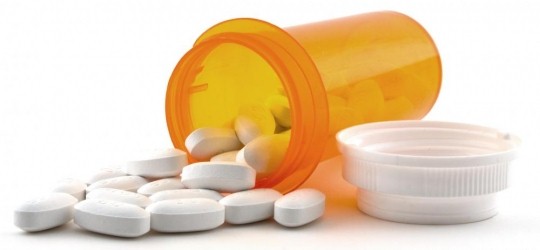Peptic ulcer disease occurs in up to 10% of the world's adult population and leads to billions of dollars in treatment. A peptic ulcer is an erosion, a hole or a sore in the lining of the esophagus (esophageal ulcer), the stomach (gastric ulcer) or the duodenum (duodenal ulcer). These ulcers are the result of corrosion of the lining of the digestive tract caused by the acidity of the digestive juices.
What Are the Symptoms of Peptic Ulcer?
 Common Symptom of Peptic Ulcer
Common Symptom of Peptic Ulcer
A common symptom of peptic ulcer is abdominal pain. This pain commonly occurs in the middle of the upper part of the abdomen, below the breastbone and above the navel. It feels like a gnawing or burning pain, which can spread to the back. The pain often comes after meals and is worse in the night or early morning, lasting from a few minutes to more than a few hours. It may be relieved by taking antacids or food, or by vomiting.
Other Symptoms of Peptic Ulcer
Peptic ulcers may also be accompanied by nausea, vomiting, weight loss, and loss of appetite.
Severe Symptoms of Peptic Ulcer
Sometimes, people can experience severe symptoms such as vomiting of blood, which indicates fast bleeding in the stomach from the ulcers. Bleeding ulcers may also manifest as black, tarry stools. Sometimes peptic ulcers are discovered only after they start bleeding. Immediate medical consultation is necessary when these symptoms occur.
When to See a Doctor
Consult a doctor if your symptoms persist and worry you. Although OTC acid blockers and antacids relieve gnawing pain, relief is often short-lived.
What Are the Causes of Peptic Ulcer?
1. Bacterial Infection
H pylori is a type of bacteria that can cause peptic ulcers in some people. Many people from North America and Western Europe harbor this bacteria in their stomachs, which spread through water and food. These bacteria trigger acid production in the stomach, which causes irritation and corrosion of the lining, leading to inflammation. Treatment consists of eradication of H pylori from the stomach to avoid recurrences.
2. Medication Problems
Some medications, especially non-steroidal anti-inflammatory drugs (NSAIDs) like ibuprofen, diclofenac, and naproxen increase the risk of peptic ulcers because they affect the stomach's protective layer. They can also reduce the stomach's blood flow and affect its ability to repair itself.
3. Genetic Factor
People who have family members with peptic ulcer have a greater risk of developing the disease.
4. Unhealthy Life Style
- Smoking. Smoking cigarettes increases your risk of developing peptic ulcers.
- Alcohol Intake. Regular heavy drinking of alcohol increases your risk of getting peptic ulcers.
5. Mental Status
Although stress does not necessarily lead to the development of peptic ulcers, people who have ulcers tend to experience worse symptoms when they are mentally stressed.
What Are the Treatments of Peptic Ulcer?
Medical Treatments for Peptic Ulcer

Medications used to treat peptic ulcers include:
- Proton pump inhibitors, such as Prilosec, Prevacid, and Nexium, which reduce stomach acid, allowing the ulcers to heal.
- Antibiotics to treat H. pylori infection. These are taken for about two weeks in combination with Pepto-Bismol and proton pump inhibitors.
- Upper endoscopy, to treat bleeding ulcers.
- Surgery may be needed for ulcers that erode the stomach wall and cause serious bleeding not controlled with endoscopy.
Home Remedies for Peptic Ulcer
- Maintain a Healthy Diet
A diet that is high in protein can help heal sores and repair tissues. However, non-meat protein sources are preferable to avoid stimulation of the digestive system. Dairy products must also be avoided because calcium increases the production of digestive acids and juices. Eat bland foods instead of spicy or oily foods to reduce stomach irritation.
Apples, onions, garlic, and cranberries are rich in flavonoids, which help reduce the growth of bacteria.
- Change Pain Relievers
Instead of taking NSAIDs regularly, ask your doctor if you can take acetaminophen (Tylenol), which has less irritating effects on the stomach.
- Refuse Cigarettes
Quit smoking, which destroys the protective lining of your stomach, increases stomach acids, and increases your risk of developing ulcers.
- Limit Alcohol Intake
Avoid excessive alcohol intake, which can irritate the stomach's mucous lining and cause inflammation, erosion and bleeding.
- Reduce Stress
Stress can worsen the symptoms of peptic ulcer. Although stress is sometimes unavoidable, you can learn to cope by exercising, spending time with family and friends, or writing a daily journal.
